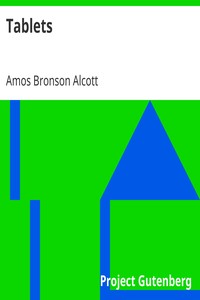Tablets by Amos Bronson Alcott
"Tablets" by A. Bronson Alcott is a philosophical work written in the late 19th century. The book appears to explore various themes related to practical and speculative aspects of life, including nature, human relationships, and personal development. Alcott’s reflections on gardening, fellowship, and culture suggest a focus on how these elements intertwine to foster a rich and fulfilling existence. The opening of "Tablets" introduces readers to the concept of gardens as a
metaphor for the ideal human condition and cultivation. Alcott muses on the historical significance of gardens in human civilization, emphasizing their role as a symbol of civility and the connection between humanity and nature. He highlights the pleasures of cultivating a garden and how it can transform one's relationship with the landscape, ultimately offering both a physical space for rejuvenation and a philosophical grounding for a more meaningful life. Through rich descriptions and reflections, the text sets the foundation for Alcott's exploration of practical wisdom, the importance of rural life, and the joys of personal and communal cultivation. (This is an automatically generated summary.)
Read or download for free
| How to read | Url | Size | |||
|---|---|---|---|---|---|
| Read now! | https://www.gutenberg.org/ebooks/36825.html.images | 295 kB | |||
| EPUB3 (E-readers incl. Send-to-Kindle) | https://www.gutenberg.org/ebooks/36825.epub3.images | 1.6 MB | |||
| EPUB (older E-readers) | https://www.gutenberg.org/ebooks/36825.epub.images | 1.6 MB | |||
| EPUB (no images, older E-readers) | https://www.gutenberg.org/ebooks/36825.epub.noimages | 169 kB | |||
| Kindle | https://www.gutenberg.org/ebooks/36825.kf8.images | 680 kB | |||
| older Kindles | https://www.gutenberg.org/ebooks/36825.kindle.images | 741 kB | |||
| Plain Text UTF-8 | https://www.gutenberg.org/ebooks/36825.txt.utf-8 | 244 kB | |||
| Download HTML (zip) | https://www.gutenberg.org/cache/epub/36825/pg36825-h.zip | 1.1 MB | |||
| There may be more files related to this item. | |||||
Similar Books
About this eBook
| Author | Alcott, Amos Bronson, 1799-1888 |
|---|---|
| Title | Tablets |
| Note | Reading ease score: 62.6 (8th & 9th grade). Neither easy nor difficult to read. |
| Credits | E-text prepared by David Edwards, Carol Ann Brown, and the Online Distributed Proofreading Team (http://www.pgdp.net) from page images generously made available by Internet Archive (http://www.archive.org) |
| Language | English |
| LoC Class | PS: Language and Literatures: American and Canadian literature |
| Subject | American essays -- 19th century |
| Category | Text |
| EBook-No. | 36825 |
| Release Date | Jul 23, 2011 |
| Copyright Status | Public domain in the USA. |
| Downloads | 258 downloads in the last 30 days. |
| Project Gutenberg eBooks are always free! | |

